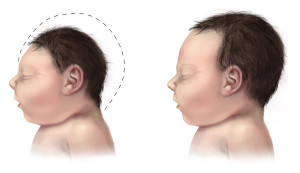I returned to our room in the cheap hotel in Paris to find a bloody mess. My roommate, John, left a note that he had gone to the hospital with his girlfriend.
We were in college and were spending the summer studying the French language. John had met Ruth in London, our first stop. She was already pregnant and had decided, although it wasn’t legal, to abort the pregnancy. She arrived in Paris several days later and thought that everything had gone well. Immediately after she got to our room she started to hemorrhage. John called an ambulance, she was hospitalized, transfused and had a D&C. She recovered eventually.
That was my first introduction, as an innocent 20 year-old, to the subject of abortion, and my first brush with gynecology. It made a lasting impression.
Two years later my fiancée (and later, wife) was in graduate school and I in medical school in a different city. One of Gail’s roommates had been out of town, then spent a night in the hospital. After she returned to the apartment the police came for an official and frightening visit. The hospital reported that Jane had had an abortion and the visit was to find the identity of the doctor who had performed it. The officials interrogated her at length but left without that information.
Fast forward to when I was in general practice in New Mexico. The records of a new patient showed that she had had a hysterectomy—not unusual for a middle-aged woman. But what was surprising was the pathology report. In addition to the expected uterus, it showed a 6-inch long splinter of wood! I asked the woman how the splinter got there. She replied that she didn’t know, that she was as mystified as me. We both knew what the real story was.
During my residency I was called to the emergency room one evening to see a woman who was pregnant and bleeding. This was her 4th pregnancy; she had 3 young children at home. I thought she could be having a miscarriage. Spotting could also be an indication that the woman was trying to cause an abortion by introducing something into her uterus. Abortion was already legal in all states in the USA, although the Supreme Court decision was less than a year old.
Back then I used to warn all women with a threatened miscarriage that it was important to tell me if they had done anything to abort the pregnancy. This was because nonmedical abortions were still common, and because of the risk of a serious infection. This woman responded “noâ€, she would never do that—she was a member of a religion that didn’t believe in abortion.
I was surprised a few hours later when the same woman returned to the ER. She told me that she returned because what I had told her worried her. She couldn’t be sick because her children needed her. She admitted that she had, indeed, tried to cause an abortion with a knitting needle.
These are cases that I can remember well of women who faced unwanted pregnancies. All of these cases are long past history, thank goodness, because now safe abortion services are available. Regrettably some people are trying to take away access to safe, empathetic and legal abortion. Worldwide over 20 million women have unsafe abortions, resulting in 50,000 maternal deaths and many more serious injuries. “Not Yet Rain†is a video made in Ethiopia about the difficulty young women have in getting safe abortions after rape. Studies show that abortion is actually more common where it is illegal!
An unplanned, unwanted pregnancy is a difficult situation for a woman to face. Sometimes things work out well and the child is adopted. Sometimes the child is raised by the mother and loved despite an inauspicious beginning. But often things don’t work out well. Currently women in the USA occasionally resort to unsafe abortions because of increased difficulty in accessing safe abortion services.
Some politicians are trying to overthrow the Supreme Court’s Roe v. Wade ruling. They put hurdles in the way of women to decrease access to abortions. They also decrease access to contraception, the best way to decrease the need for abortion, by defunding Planned Parenthood. They advocate needless requirements for clinics that have provided safe abortion services for years without them. For women’s sake and for the sake of our already overcrowded planet we must maintain access to safe, legal abortion services.
© Richard Grossman MD, 2016
Category: Abortion
Image courtesy of the CDC
“The Zika virus provides a glimpse into a future we should do everything possible to avoid, a terrifying reminder why the fight for a stable physical planet is the fight of our time.” Bill McKibben
“Don’t get pregnant until 2018†is the advice given women in El Salvador. Yet only two thirds of married women there are using modern contraception.
The Zika virus, declared “public health emergency of international concernâ€, is the cause of the Salvadorian government’s warning against pregnancy. “We’d like to suggest to all the women of fertile age that they take steps to plan their pregnancies, and avoid getting pregnant between this year and next….†This quote from Deputy Health Minister Eduardo Espinoza is frightening.
Although it hasn’t caused an epidemic in Africa where it was first identified, it is raising havoc in the Americas. Zika virus symptoms are usually mild: eye inflammation, fever, rash and joint irritation—but the majority of infected people have no symptoms at all. There is no treatment for Zika disease. Mosquitoes of the Aedes genus spread Zika, dengue and other diseases, and it may also be spread by sex.
The best way to avoid getting Zika is to avoid being bitten by mosquitoes—insect repellant, dress appropriately and avoid areas where mosquitoes live. So far Colorado is safe from Aedes.
Climate change has recently increased the range of Aedes mosquitoes. Air travel has allowed the virus to spread like lightning. Humans have destabilized the planet, as McKibben states.
The Zika story in the Americas is still being written, but began last year. Brazilian doctors noticed a huge increase in the incidence of babies born with small heads—microcephaly. They found an association with the mothers having had Zika virus infection early in pregnancy.
I am terrified that brain scans of affected babies show other serious abnormalities usually associated with profoundly impairment. There are dozens of causes of microcephaly, but most of them are associated with cognitive and other problems.
The CDC recommends avoiding Zika when a woman is, or could become, pregnant. If the mother could have been exposed to the virus during pregnancy, it recommends ultrasounds to monitor fetal head growth.
What is so concerning is that where Zika is found, family planning services may be spotty. Fortunately El Salvador, where women are supposed to abstain from pregnancy for the next 2 years, has had a pretty successful reproductive health program. It is regrettable, however, that El Salvador is one of only 6 countries worldwide that outlaw abortion for any reason.
Beloved Pope Francis recently gave Catholic women who are at risk of Zika virus permission to use “artificial†contraception. This is great news for the millions of women where Zika is a threat, and will hopefully encourage governments in those areas to make contraception easily available.
One of the reasons that the U.S.A. liberalized of our abortion laws was that we had a viral epidemic that caused severe fetal damage. Fortunately, immunization has made rubella a disease of the past.
What happens if a woman is infected with Zika in pregnancy and ultrasound shows that her fetus has microcephaly? The Salvadorian punishment for having an abortion is 2 to 8 years in prison for the woman and up to 12 years for the doctor. Nevertheless hundreds of women risk having an illegal abortion. Often they cause their own abortions by thrusting a knitting needle or piece of wood into their uterus. Tragically, suicide is not uncommon among pregnant women in El Salvador.
Here is a hypothetical situation. Luisa, a Salvadoran campesina, has two healthy children. She was taking birth control pills, but her clinic ran out. Shortly after conceiving her third pregnancy she had what she thought was a cold with a mild red rash. During a routine ultrasound at 5 months the doctor said everything was ok except the fetus’s head seemed small, and she could see calcifications in the brain. What can Luisa do? If this baby’s brain was severely damaged she couldn’t afford to take care of it, and her other two children would suffer because of the family’s very limited resources.
What is wrong with a society that puts women in such a difficult bind? Rape is common in El Salvador, yet a woman who has been raped or is carrying a terribly compromised fetus has no legal recourse. Climate change and international travel make it more important that women everywhere have access to family planning and safe abortion services.
© Richard Grossman MD, 2016

